1 of 14
Download to read offline
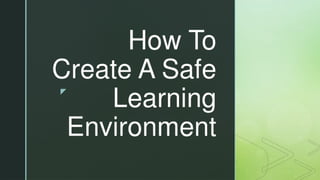
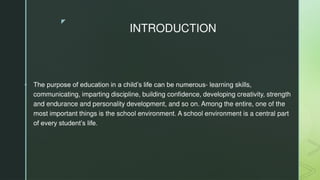
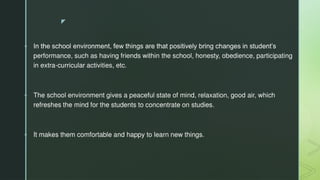
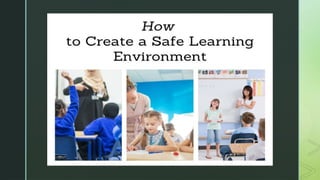
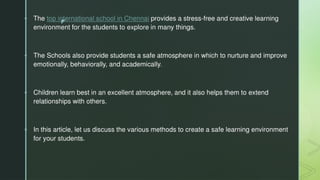
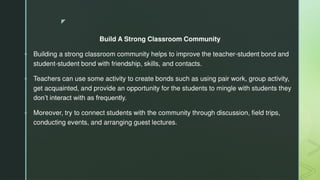
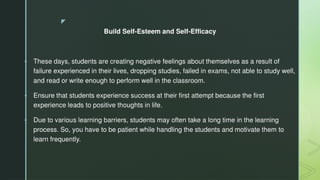
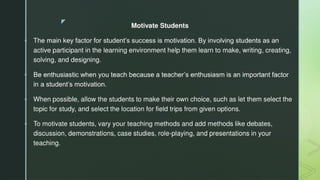
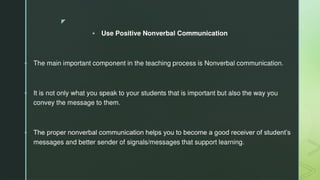
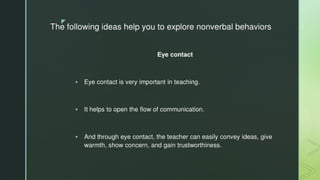
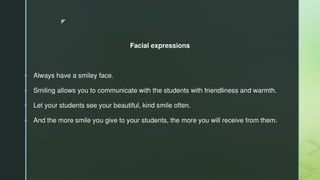
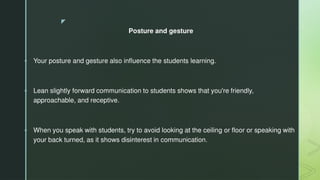
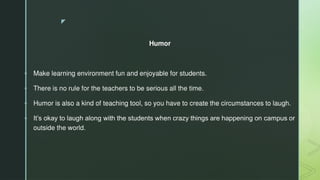

Ad
Recommended
410645054-Hots.pptx1223333333333333333333333333
410645054-Hots.pptx1223333333333333333333333333jonaviecatalan
Ěý
This document outlines strategies for developing critical and creative thinking skills in students through various teaching methods. It emphasizes the importance of higher-order thinking skills (HOTS) and provides sample practices for effective instruction, including questioning techniques and encouraging creativity. Additionally, it suggests a development plan for teachers to enhance their own teaching strategies in fostering these skills.Teaching-Strategies-to-Develop-Critical-and-Creative-Thinking_GRACE DILAO.pptx
Teaching-Strategies-to-Develop-Critical-and-Creative-Thinking_GRACE DILAO.pptxjonaviecatalan
Ěý
The document presents various teaching strategies aimed at developing students' critical, creative, and higher-order thinking skills, emphasizing methods like problem-based learning and effective questioning techniques. It highlights the importance of frameworks such as Bloom's taxonomy for guiding educators in facilitating student engagement beyond basic memorization. Additionally, it discusses practical examples and strategies, including visualization and graphic organizers, to enhance understanding and application of these skills in real-world contexts.410645054-Hots.pptx12322788881888773777777
410645054-Hots.pptx12322788881888773777777jonaviecatalan
Ěý
The document outlines strategies for developing critical and creative thinking, along with higher-order thinking skills (HOTS) in students. It contrasts different teaching methods, emphasizing the importance of engaging instructional practices and effective questioning strategies. Additionally, it suggests a development plan to enhance educators' skills in facilitating higher-order thinking among learners.Managing teams.pptx123456789999999999999
Managing teams.pptx123456789999999999999jonaviecatalan
Ěý
The document discusses the characteristics and types of effective teams within organizations, emphasizing that a team is a group of individuals working towards a common goal. It outlines the various structures of teams, including functional, cross-functional, and virtual teams, as well as challenges in team management, such as cooperation and information sharing. Additionally, it highlights the importance of leadership and communication in fostering effective teamwork, using the example of U.S. air force controllers managing chaotic air traffic after a disaster.report on PHILOSOPHY OF MAN.pp report ontx
report on PHILOSOPHY OF MAN.pp report ontxjonaviecatalan
Ěý
The document discusses the philosophy of man, defining philosophy as the study of existence, reality, and knowledge. It outlines the six components or branches of philosophy, such as metaphysics, epistemology, ethics, logic, aesthetics, and political philosophy, and their significance in understanding our lives and moral decisions. The importance of philosophy is emphasized in developing critical thinking, personal growth, and improving societal behavior.quarterly awarding.pptx dddhhquarterly awarding
quarterly awarding.pptx dddhhquarterly awardingjonaviecatalan
Ěý
Salgan Elementary School in the District of Maayon, Capiz, welcomes monitoring officials from the Department of Education on July 31, 2024. The event includes a card day and recognition ceremony for the first quarter. This reflects the school's commitment to engaging with education officials and celebrating student achievements.DRRM MOVs - Copy (2).pptxfffffdrrm drrmmm
DRRM MOVs - Copy (2).pptxfffffdrrm drrmmmjonaviecatalan
Ěý
The document outlines the disaster risk reduction and management (DRRM) initiatives implemented at Salgan Elementary School in Capiz for the school year 2022-2023. It details various measures including natural hazard assessments, safety protocols, and educational programs aimed at enhancing disaster preparedness and resilience among students and staff. Key components include the establishment of DRRM teams, regular safety drills, and integration of DRRM principles into the school curriculum.curriculuminnovations-140202033422-phpapp01.pptx
curriculuminnovations-140202033422-phpapp01.pptxjonaviecatalan
Ěý
The document outlines the K-12 education system in the Philippines, detailing its structure, the challenges it faces, and the goals for enhancing educational quality. It emphasizes the need for improved resources, trained teachers, and effective curricula to foster a better-educated society. Additionally, it discusses the funding required for its implementation and the broader context of global educational quality concerns.K TO 12.pptxkkkkkkkkkkkkkkkkkkkkkkkkkkkkkkkkkkkkkkkkk
K TO 12.pptxkkkkkkkkkkkkkkkkkkkkkkkkkkkkkkkkkkkkkkkkkjonaviecatalan
Ěý
The K to 12 program in the Philippines extends basic education to 12 years and includes universal kindergarten, aiming to prepare students for higher education, vocational skills, or entrepreneurship. It emphasizes 21st-century skills and offers specialized tracks in senior high school, but faces criticism for increased financial burdens on families and potential dropout rates. Despite challenges, the program was implemented to enhance educational outcomes and better equip graduates for the workforce.Models of Curriculum Developmennnnnnnnt.pptx
Models of Curriculum Developmennnnnnnnt.pptxjonaviecatalan
Ěý
The document outlines various models of curriculum development, emphasizing the differences between Tyler's deductive model and Taba's grassroots approach. It highlights the importance of clearly defined instructional objectives in curriculum planning and the participatory role of teachers in developing a relevant curriculum. Additionally, it introduces the Saylor, Alexander, and Lewis model, as well as the Oliva model, which address the needs of specific student populations and encourage flexibility in implementation.Lesson-1.-EDM-210-Filipino-Psychology-June-18-2024.pptx
Lesson-1.-EDM-210-Filipino-Psychology-June-18-2024.pptxjonaviecatalan
Ěý
This document discusses the origins and development of Filipino psychology, highlighting the contributions of Virgilio G. Enriquez as a pivotal figure in establishing a culturally relevant psychological framework in the Philippines. It critiques the inadequacies of Western-oriented psychological approaches that mischaracterize Filipino behaviors and emphasizes the efforts made in the 1970s to develop local concepts and studies. The document also outlines activities for reinforcing learning, such as creating a concept map and writing an essay on applying Filipino psychology to contemporary issues.learningprocess-161209191320.pptddddhdddddddddddd
learningprocess-161209191320.pptddddhddddddddddddjonaviecatalan
Ěý
The document provides an overview of the learning process, defining it as a change in behavior resulting from experience and practice, and highlights that learning occurs across various stages in life and among all living beings. It outlines principles and theories of learning, including behavioral, cognitive, and social constructivism, emphasizing methods such as participation and relevance in enhancing learning. Various domains and theories of learning are discussed, including multiple intelligences and brain-based learning, along with practical classroom strategies to support effective learning.kindergarten Act.pptx hhhhhhhhhhhhhhhhhhhhhhhhhhh
kindergarten Act.pptx hhhhhhhhhhhhhhhhhhhhhhhhhhhjonaviecatalan
Ěý
The document outlines the duties, powers, and functions of Jonavie C. Denonong as a reporter in education. Responsibilities include overseeing curriculum implementation, developing teaching strategies, and managing the professional development program for teachers. Additionally, it details the authority to set qualifications for hiring teachers and to supervise early childhood education institutions.4chapter4-religion-111109184935-phpapp02.pptx
4chapter4-religion-111109184935-phpapp02.pptxjonaviecatalan
Ěý
The document discusses the nature of religion, defining it as a belief system involving the supernatural and social constructs that provide meaning, social solidarity, control, and coping mechanisms for uncertainty. It outlines various types of religions, their functions, and the evolution and origins of religious beliefs, highlighting the roles they play in society and their impact on social cohesion. Furthermore, it addresses contemporary issues like fundamentalism, revitalization movements, and the interplay between religion and social change.4-1tchngprofkindergarten-160313193912 (1) (1).pdf
4-1tchngprofkindergarten-160313193912 (1) (1).pdfjonaviecatalan
Ěý
Republic Act No. 10157, known as the Kindergarten Education Act, institutionalizes kindergarten as a mandatory part of basic education in the Philippines to promote early childhood development. It establishes a framework for the implementation of kindergarten education, including the use of mother tongue-based multilingual education and oversight by the Department of Education. The act also provides guidelines for appropriations, implementation rules, and the roles of various agencies in ensuring quality early education.INSET-2023-Certficate.pptx INSET INSET INSET
INSET-2023-Certficate.pptx INSET INSET INSETjonaviecatalan
Ěý
The document consists of certificates awarded by the Department of Education in the Philippines for the 2023 in-service training for teachers held from February 6-10, 2023. Rexieme D. Aurella is recognized for outstanding performance as a resource speaker, while Jane S. Barona receives a certificate of participation for her active involvement. Both certificates were issued on February 10, 2022, at Don Ynocencio A. Del Rosario Memorial School in Roxas City.E-IMPACT-PPT.pptx E IMPACT E IMPACT E IMPACT
E-IMPACT-PPT.pptx E IMPACT E IMPACT E IMPACTjonaviecatalan
Ěý
E-impact is a technology-enhanced learning delivery mode for basic education aimed at improving student engagement and reducing dropout rates. It emphasizes active participation, individualized learning, and community involvement, with roles redefined for teachers, students, and parents. By implementing a modular approach and fostering peer learning, E-impact seeks to create a supportive and effective educational environment that focuses on mastery and lifelong learning.COT-Presentation (1).pptx COT PRESENTATION
COT-Presentation (1).pptx COT PRESENTATIONjonaviecatalan
Ěý
Ang dokumento ay isang presentasyon para sa kindergarten na inihanda ni Jonavie C. Denonong. Tinalakay nito ang mga bahagi ng mga tanim tulad ng ugat, katawan, bulak, bunga, dahon, at sanga sa pamamagitan ng mga aktibidad. May mga direksyon para sa mga gawain na naglalayong matutunan ng mga bata ang tamang pangalan at bahagi ng mga tanim.JONAVIE PHILOSOPHY OF MAN.ppt PHILOSOPHY x
JONAVIE PHILOSOPHY OF MAN.ppt PHILOSOPHY xjonaviecatalan
Ěý
The document explores the philosophy of man, defining philosophy as the study of reality, existence, and knowledge. It covers key branches such as metaphysics, epistemology, ethics, logic, aesthetics, and political philosophy, emphasizing the significance of philosophical inquiry in understanding oneself, others, and the world. Additionally, it highlights the objectives and importance of philosophy in enhancing critical thinking, moral decision-making, and personal development.QUARTER 2 week 9 (1).pptx quarter 2 activity
QUARTER 2 week 9 (1).pptx quarter 2 activityjonaviecatalan
Ěý
Ang dokumento ay tungkol sa iba't ibang mga uri ng klima na matatagpuan sa kapaligiran. Tinalakay nito ang mga kondisyon tulad ng mainit, mahangin, maulan, at nagbabagyo. Ang petsa ng dokumento ay Enero 27, 2022, at ito ay para sa linggo 8 ng mga bata.JONAVIE PHILOSOPHY OF MAN.pptxjjhvvffbbg
JONAVIE PHILOSOPHY OF MAN.pptxjjhvvffbbgjonaviecatalan
Ěý
The document discusses the philosophy of man, defining philosophy as the study of reality, existence, and knowledge. It outlines six branches of philosophy, including metaphysics and ethics, and emphasizes the objectives and importance of philosophy in understanding ourselves, others, and the world. Additionally, it highlights how philosophy fosters critical thinking, moral reasoning, and personal development.Concept-of-Curriculum.pptxhhghjjjggyuubbgf
Concept-of-Curriculum.pptxhhghjjjggyuubbgfjonaviecatalan
Ěý
The document discusses the concept of curriculum, which is described as a dynamic system encompassing all learning experiences in both school and society, evolving from traditional, subject-centered models to modern, child-focused approaches. It outlines various curriculum theories and models proposed by key figures in education, such as Ralph Tyler and John Dewey, while highlighting the elements that form an effective curriculum and the need for continuous improvement and assessment. Additionally, it covers the importance of educational approaches like critical pedagogy, developed by Paulo Freire, emphasizing education as a means for social change and empowerment.NATURE-AND-CHARACTERISTICS.pptxbbbbbbnnnnk
NATURE-AND-CHARACTERISTICS.pptxbbbbbbnnnnkjonaviecatalan
Ěý
The document discusses the nature and characteristics of curriculum, emphasizing its definition, purpose, components, and different types. It outlines the curriculum development process, including needs assessment, design, implementation, evaluation, and revision, along with principles of effective curriculum development and challenges faced. Key characteristics of a curriculum include being systematic, flexible, comprehensive, integrative, student-centered, dynamic, and culturally relevant.2024-LS-G3-NRP-Q1-Week4.pdf philosophy of man
2024-LS-G3-NRP-Q1-Week4.pdf philosophy of manjonaviecatalan
Ěý
The document outlines a national reading program lesson script for teachers, focusing on phonetics and vocabulary development for young learners in Quarter 1, Week 4. It includes learning objectives, teaching procedures, and guidance on utilizing various educational resources while adhering to copyright laws. The program aims to enhance reading and comprehension skills through structured lessons on specific letters and sounds.3.-MOTIVATING-EMPLOYEE-PERFORMANCE-THROUGH-REWARDS.pptx
3.-MOTIVATING-EMPLOYEE-PERFORMANCE-THROUGH-REWARDS.pptxjonaviecatalan
Ěý
The document discusses strategies for motivating employee performance through rewards and the importance of goal setting as a motivational tool within organizations. It outlines key elements of effective goal-setting, such as goal difficulty, specificity, acceptance, and commitment, and how they influence organizational performance and individual motivation. The text also highlights the role of intrinsic and extrinsic rewards, performance management, and various compensation strategies in enhancing employee engagement and satisfaction.1_millican_slides.pdf philosophy of mans
1_millican_slides.pdf philosophy of mansjonaviecatalan
Ěý
The document discusses the historical background and fundamental questions in general philosophy, particularly focusing on epistemology and metaphysics. It traces the development of philosophical thought from classical philosophers to the rise of skepticism and various philosophical themes, illustrating the significance of studying philosophy historically. Additionally, it highlights key philosophical figures and movements, such as Descartes and Galileo, that shaped contemporary philosophical discourse.4.-Self-Management.pptx self management subject
4.-Self-Management.pptx self management subjectjonaviecatalan
Ěý
El documento describe un programa de gestión personal en el contexto educativo, donde se busca mejorar la resiliencia, la sensibilidad y la compasión en el lugar de trabajo. Se presentan objetivos como la identificación de factores de estrés, el manejo del mismo y la gestión de conflictos, junto con actividades prácticas para desarrollar habilidades de auto-gestión. También se discuten métodos para manejar el estrés y resolver conflictos, enfatizando la importancia de la comunicación efectiva y un ambiente laboral positivo.Lesson-5-EDM-210-July-4-2024-Rethinking-Filipino-Values.pptx
Lesson-5-EDM-210-July-4-2024-Rethinking-Filipino-Values.pptxjonaviecatalan
Ěý
The document discusses the re-examination of Filipino values through the lens of Filipino psychology, challenging traditional interpretations of values such as 'bahala na', 'hiya', 'utang na loob', and 'pakikisama'. It highlights the need to understand these values in their indigenous context rather than through foreign lenses, emphasizing concepts like shared identity and emotional sensitivity in Filipino culture. The text also addresses cultural divides within Filipino society, contrasting mass-oriented and elitist worldviews, and suggesting that understanding these dynamics is essential for grasping the Filipino personality.More Related Content
More from jonaviecatalan (20)
K TO 12.pptxkkkkkkkkkkkkkkkkkkkkkkkkkkkkkkkkkkkkkkkkk
K TO 12.pptxkkkkkkkkkkkkkkkkkkkkkkkkkkkkkkkkkkkkkkkkkjonaviecatalan
Ěý
The K to 12 program in the Philippines extends basic education to 12 years and includes universal kindergarten, aiming to prepare students for higher education, vocational skills, or entrepreneurship. It emphasizes 21st-century skills and offers specialized tracks in senior high school, but faces criticism for increased financial burdens on families and potential dropout rates. Despite challenges, the program was implemented to enhance educational outcomes and better equip graduates for the workforce.Models of Curriculum Developmennnnnnnnt.pptx
Models of Curriculum Developmennnnnnnnt.pptxjonaviecatalan
Ěý
The document outlines various models of curriculum development, emphasizing the differences between Tyler's deductive model and Taba's grassroots approach. It highlights the importance of clearly defined instructional objectives in curriculum planning and the participatory role of teachers in developing a relevant curriculum. Additionally, it introduces the Saylor, Alexander, and Lewis model, as well as the Oliva model, which address the needs of specific student populations and encourage flexibility in implementation.Lesson-1.-EDM-210-Filipino-Psychology-June-18-2024.pptx
Lesson-1.-EDM-210-Filipino-Psychology-June-18-2024.pptxjonaviecatalan
Ěý
This document discusses the origins and development of Filipino psychology, highlighting the contributions of Virgilio G. Enriquez as a pivotal figure in establishing a culturally relevant psychological framework in the Philippines. It critiques the inadequacies of Western-oriented psychological approaches that mischaracterize Filipino behaviors and emphasizes the efforts made in the 1970s to develop local concepts and studies. The document also outlines activities for reinforcing learning, such as creating a concept map and writing an essay on applying Filipino psychology to contemporary issues.learningprocess-161209191320.pptddddhdddddddddddd
learningprocess-161209191320.pptddddhddddddddddddjonaviecatalan
Ěý
The document provides an overview of the learning process, defining it as a change in behavior resulting from experience and practice, and highlights that learning occurs across various stages in life and among all living beings. It outlines principles and theories of learning, including behavioral, cognitive, and social constructivism, emphasizing methods such as participation and relevance in enhancing learning. Various domains and theories of learning are discussed, including multiple intelligences and brain-based learning, along with practical classroom strategies to support effective learning.kindergarten Act.pptx hhhhhhhhhhhhhhhhhhhhhhhhhhh
kindergarten Act.pptx hhhhhhhhhhhhhhhhhhhhhhhhhhhjonaviecatalan
Ěý
The document outlines the duties, powers, and functions of Jonavie C. Denonong as a reporter in education. Responsibilities include overseeing curriculum implementation, developing teaching strategies, and managing the professional development program for teachers. Additionally, it details the authority to set qualifications for hiring teachers and to supervise early childhood education institutions.4chapter4-religion-111109184935-phpapp02.pptx
4chapter4-religion-111109184935-phpapp02.pptxjonaviecatalan
Ěý
The document discusses the nature of religion, defining it as a belief system involving the supernatural and social constructs that provide meaning, social solidarity, control, and coping mechanisms for uncertainty. It outlines various types of religions, their functions, and the evolution and origins of religious beliefs, highlighting the roles they play in society and their impact on social cohesion. Furthermore, it addresses contemporary issues like fundamentalism, revitalization movements, and the interplay between religion and social change.4-1tchngprofkindergarten-160313193912 (1) (1).pdf
4-1tchngprofkindergarten-160313193912 (1) (1).pdfjonaviecatalan
Ěý
Republic Act No. 10157, known as the Kindergarten Education Act, institutionalizes kindergarten as a mandatory part of basic education in the Philippines to promote early childhood development. It establishes a framework for the implementation of kindergarten education, including the use of mother tongue-based multilingual education and oversight by the Department of Education. The act also provides guidelines for appropriations, implementation rules, and the roles of various agencies in ensuring quality early education.INSET-2023-Certficate.pptx INSET INSET INSET
INSET-2023-Certficate.pptx INSET INSET INSETjonaviecatalan
Ěý
The document consists of certificates awarded by the Department of Education in the Philippines for the 2023 in-service training for teachers held from February 6-10, 2023. Rexieme D. Aurella is recognized for outstanding performance as a resource speaker, while Jane S. Barona receives a certificate of participation for her active involvement. Both certificates were issued on February 10, 2022, at Don Ynocencio A. Del Rosario Memorial School in Roxas City.E-IMPACT-PPT.pptx E IMPACT E IMPACT E IMPACT
E-IMPACT-PPT.pptx E IMPACT E IMPACT E IMPACTjonaviecatalan
Ěý
E-impact is a technology-enhanced learning delivery mode for basic education aimed at improving student engagement and reducing dropout rates. It emphasizes active participation, individualized learning, and community involvement, with roles redefined for teachers, students, and parents. By implementing a modular approach and fostering peer learning, E-impact seeks to create a supportive and effective educational environment that focuses on mastery and lifelong learning.COT-Presentation (1).pptx COT PRESENTATION
COT-Presentation (1).pptx COT PRESENTATIONjonaviecatalan
Ěý
Ang dokumento ay isang presentasyon para sa kindergarten na inihanda ni Jonavie C. Denonong. Tinalakay nito ang mga bahagi ng mga tanim tulad ng ugat, katawan, bulak, bunga, dahon, at sanga sa pamamagitan ng mga aktibidad. May mga direksyon para sa mga gawain na naglalayong matutunan ng mga bata ang tamang pangalan at bahagi ng mga tanim.JONAVIE PHILOSOPHY OF MAN.ppt PHILOSOPHY x
JONAVIE PHILOSOPHY OF MAN.ppt PHILOSOPHY xjonaviecatalan
Ěý
The document explores the philosophy of man, defining philosophy as the study of reality, existence, and knowledge. It covers key branches such as metaphysics, epistemology, ethics, logic, aesthetics, and political philosophy, emphasizing the significance of philosophical inquiry in understanding oneself, others, and the world. Additionally, it highlights the objectives and importance of philosophy in enhancing critical thinking, moral decision-making, and personal development.QUARTER 2 week 9 (1).pptx quarter 2 activity
QUARTER 2 week 9 (1).pptx quarter 2 activityjonaviecatalan
Ěý
Ang dokumento ay tungkol sa iba't ibang mga uri ng klima na matatagpuan sa kapaligiran. Tinalakay nito ang mga kondisyon tulad ng mainit, mahangin, maulan, at nagbabagyo. Ang petsa ng dokumento ay Enero 27, 2022, at ito ay para sa linggo 8 ng mga bata.JONAVIE PHILOSOPHY OF MAN.pptxjjhvvffbbg
JONAVIE PHILOSOPHY OF MAN.pptxjjhvvffbbgjonaviecatalan
Ěý
The document discusses the philosophy of man, defining philosophy as the study of reality, existence, and knowledge. It outlines six branches of philosophy, including metaphysics and ethics, and emphasizes the objectives and importance of philosophy in understanding ourselves, others, and the world. Additionally, it highlights how philosophy fosters critical thinking, moral reasoning, and personal development.Concept-of-Curriculum.pptxhhghjjjggyuubbgf
Concept-of-Curriculum.pptxhhghjjjggyuubbgfjonaviecatalan
Ěý
The document discusses the concept of curriculum, which is described as a dynamic system encompassing all learning experiences in both school and society, evolving from traditional, subject-centered models to modern, child-focused approaches. It outlines various curriculum theories and models proposed by key figures in education, such as Ralph Tyler and John Dewey, while highlighting the elements that form an effective curriculum and the need for continuous improvement and assessment. Additionally, it covers the importance of educational approaches like critical pedagogy, developed by Paulo Freire, emphasizing education as a means for social change and empowerment.NATURE-AND-CHARACTERISTICS.pptxbbbbbbnnnnk
NATURE-AND-CHARACTERISTICS.pptxbbbbbbnnnnkjonaviecatalan
Ěý
The document discusses the nature and characteristics of curriculum, emphasizing its definition, purpose, components, and different types. It outlines the curriculum development process, including needs assessment, design, implementation, evaluation, and revision, along with principles of effective curriculum development and challenges faced. Key characteristics of a curriculum include being systematic, flexible, comprehensive, integrative, student-centered, dynamic, and culturally relevant.2024-LS-G3-NRP-Q1-Week4.pdf philosophy of man
2024-LS-G3-NRP-Q1-Week4.pdf philosophy of manjonaviecatalan
Ěý
The document outlines a national reading program lesson script for teachers, focusing on phonetics and vocabulary development for young learners in Quarter 1, Week 4. It includes learning objectives, teaching procedures, and guidance on utilizing various educational resources while adhering to copyright laws. The program aims to enhance reading and comprehension skills through structured lessons on specific letters and sounds.3.-MOTIVATING-EMPLOYEE-PERFORMANCE-THROUGH-REWARDS.pptx
3.-MOTIVATING-EMPLOYEE-PERFORMANCE-THROUGH-REWARDS.pptxjonaviecatalan
Ěý
The document discusses strategies for motivating employee performance through rewards and the importance of goal setting as a motivational tool within organizations. It outlines key elements of effective goal-setting, such as goal difficulty, specificity, acceptance, and commitment, and how they influence organizational performance and individual motivation. The text also highlights the role of intrinsic and extrinsic rewards, performance management, and various compensation strategies in enhancing employee engagement and satisfaction.1_millican_slides.pdf philosophy of mans
1_millican_slides.pdf philosophy of mansjonaviecatalan
Ěý
The document discusses the historical background and fundamental questions in general philosophy, particularly focusing on epistemology and metaphysics. It traces the development of philosophical thought from classical philosophers to the rise of skepticism and various philosophical themes, illustrating the significance of studying philosophy historically. Additionally, it highlights key philosophical figures and movements, such as Descartes and Galileo, that shaped contemporary philosophical discourse.4.-Self-Management.pptx self management subject
4.-Self-Management.pptx self management subjectjonaviecatalan
Ěý
El documento describe un programa de gestión personal en el contexto educativo, donde se busca mejorar la resiliencia, la sensibilidad y la compasión en el lugar de trabajo. Se presentan objetivos como la identificación de factores de estrés, el manejo del mismo y la gestión de conflictos, junto con actividades prácticas para desarrollar habilidades de auto-gestión. También se discuten métodos para manejar el estrés y resolver conflictos, enfatizando la importancia de la comunicación efectiva y un ambiente laboral positivo.Lesson-5-EDM-210-July-4-2024-Rethinking-Filipino-Values.pptx
Lesson-5-EDM-210-July-4-2024-Rethinking-Filipino-Values.pptxjonaviecatalan
Ěý
The document discusses the re-examination of Filipino values through the lens of Filipino psychology, challenging traditional interpretations of values such as 'bahala na', 'hiya', 'utang na loob', and 'pakikisama'. It highlights the need to understand these values in their indigenous context rather than through foreign lenses, emphasizing concepts like shared identity and emotional sensitivity in Filipino culture. The text also addresses cultural divides within Filipino society, contrasting mass-oriented and elitist worldviews, and suggesting that understanding these dynamics is essential for grasping the Filipino personality.